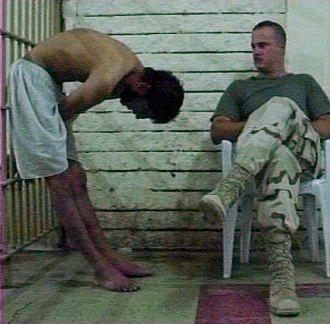Abu Ghraib torture and prisoner abuse




Abu Ghraib torture and prisoner abuse refers to a series of human rights violations committed by members of the United States Army and the Central Intelligence Agency against detainees held in the Abu Ghraib Prison in Iraq. These abuses occurred in the context of the Iraq War, with the most notorious incidents taking place from late 2003 to early 2004. The revelations of the abuses, including physical, psychological, and sexual abuse, as well as torture, rape, sodomy, and homicide of prisoners, caused widespread outrage and condemnation both in the United States and internationally.
Background[edit]
The Abu Ghraib Prison, located near Baghdad, has a long history of being used as a site for torture and executions, first under the regime of Saddam Hussein and later by U.S. forces following the 2003 invasion of Iraq. The prison was initially used by the U.S. military to detain individuals suspected of insurgency against the coalition forces.
Discovery and Exposure[edit]
The abuse at Abu Ghraib was first exposed in April 2004 when photographs showing prisoners being abused by U.S. military personnel were leaked to the media. These images showed detainees being subjected to degrading treatment, including being stacked in human pyramids, forced into stress positions, threatened with dogs, and being hooded and naked. The photographs led to an international outcry and raised questions about the conduct of U.S. forces in Iraq and the policies regarding the treatment of detainees.
Investigations and Repercussions[edit]
Following the exposure, the U.S. military launched several investigations into the abuses at Abu Ghraib. The most notable of these was the Taguba Report, which confirmed the occurrence of widespread abuse and pointed to both systemic issues and failures in leadership and oversight. Several soldiers were charged and convicted for their roles in the abuse, receiving varying sentences. However, there was criticism that higher-ranking officials and policymakers who may have authorized or condoned the use of torture techniques were not held accountable.
Impact and Legacy[edit]
The Abu Ghraib scandal had a profound impact on the global perception of the United States, damaging its image as a proponent of human rights and the rule of law. It also sparked a debate about the use of torture and the treatment of detainees in the context of the war on terror. The scandal highlighted the need for greater oversight and accountability within the military and intelligence services and led to calls for policy changes regarding the treatment of prisoners.
See Also[edit]
Ad. Transform your life with W8MD's Budget GLP-1 injections from $75


W8MD offers a medical weight loss program to lose weight in Philadelphia. Our physician-supervised medical weight loss provides:
- Weight loss injections in NYC (generic and brand names):
- Zepbound / Mounjaro, Wegovy / Ozempic, Saxenda
- Most insurances accepted or discounted self-pay rates. We will obtain insurance prior authorizations if needed.
- Generic GLP1 weight loss injections from $75 for the starting dose.
- Also offer prescription weight loss medications including Phentermine, Qsymia, Diethylpropion, Contrave etc.
NYC weight loss doctor appointmentsNYC weight loss doctor appointments
Start your NYC weight loss journey today at our NYC medical weight loss and Philadelphia medical weight loss clinics.
- Call 718-946-5500 to lose weight in NYC or for medical weight loss in Philadelphia 215-676-2334.
- Tags:NYC medical weight loss, Philadelphia lose weight Zepbound NYC, Budget GLP1 weight loss injections, Wegovy Philadelphia, Wegovy NYC, Philadelphia medical weight loss, Brookly weight loss and Wegovy NYC
|
WikiMD's Wellness Encyclopedia |
| Let Food Be Thy Medicine Medicine Thy Food - Hippocrates |
Medical Disclaimer: WikiMD is not a substitute for professional medical advice. The information on WikiMD is provided as an information resource only, may be incorrect, outdated or misleading, and is not to be used or relied on for any diagnostic or treatment purposes. Please consult your health care provider before making any healthcare decisions or for guidance about a specific medical condition. WikiMD expressly disclaims responsibility, and shall have no liability, for any damages, loss, injury, or liability whatsoever suffered as a result of your reliance on the information contained in this site. By visiting this site you agree to the foregoing terms and conditions, which may from time to time be changed or supplemented by WikiMD. If you do not agree to the foregoing terms and conditions, you should not enter or use this site. See full disclaimer.
Credits:Most images are courtesy of Wikimedia commons, and templates, categories Wikipedia, licensed under CC BY SA or similar.
Translate this page: - East Asian
中文,
日本,
한국어,
South Asian
हिन्दी,
தமிழ்,
తెలుగు,
Urdu,
ಕನ್ನಡ,
Southeast Asian
Indonesian,
Vietnamese,
Thai,
မြန်မာဘာသာ,
বাংলা
European
español,
Deutsch,
français,
Greek,
português do Brasil,
polski,
română,
русский,
Nederlands,
norsk,
svenska,
suomi,
Italian
Middle Eastern & African
عربى,
Turkish,
Persian,
Hebrew,
Afrikaans,
isiZulu,
Kiswahili,
Other
Bulgarian,
Hungarian,
Czech,
Swedish,
മലയാളം,
मराठी,
ਪੰਜਾਬੀ,
ગુજરાતી,
Portuguese,
Ukrainian
